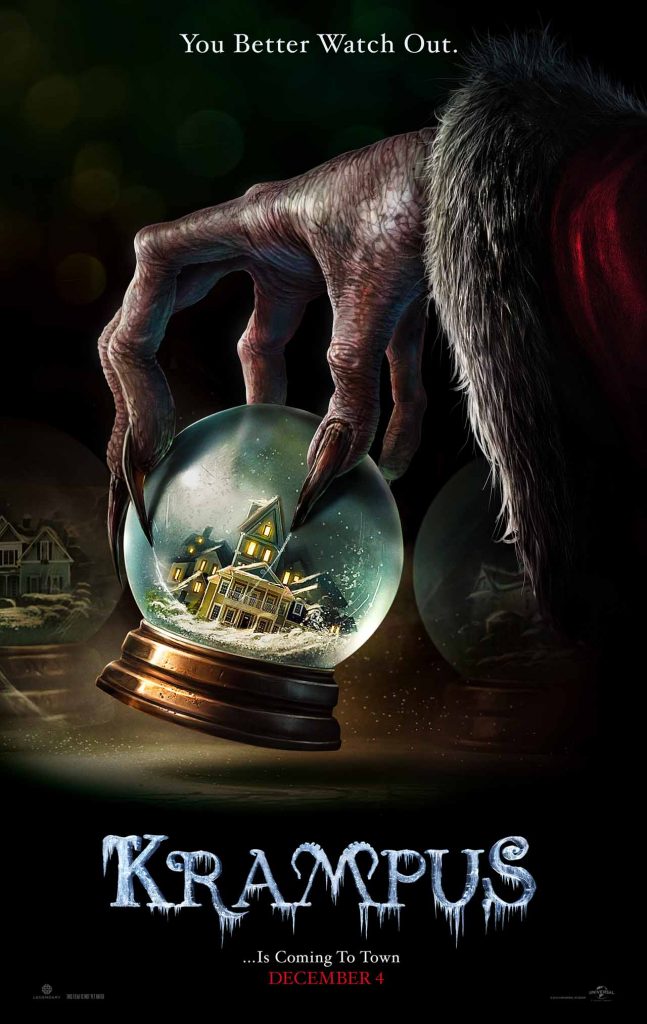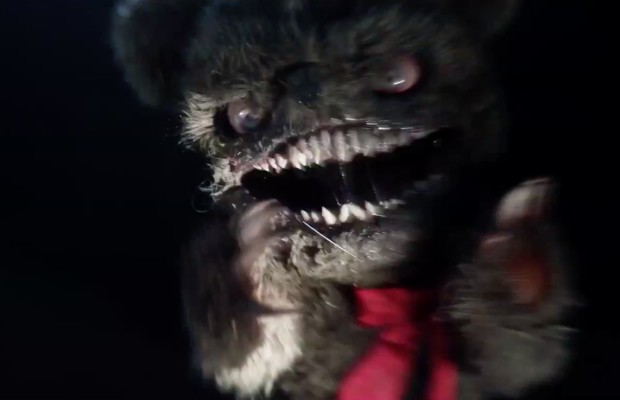In Black Snow, the Deadshirt crew takes a look at some darker entries in the yuletide cinematic canon.
We’ve covered a lot of different Christmas movies so far, but all of them tend towards some level of togetherness, or redemption, or intrinsic goodness and heroism. Whether Christmas is a prominent element or just set dressing, Christmas movies are about joy. Krampus is different. Krampus is maybe the meanest movie in the world. From pretty much minute one, it’s a relentlessly cynical, dark story. It’s often very funny, at times frightening and stylish, but it’s a movie where everyone is awful and yet no one deserves their fate. After seeing it in theaters, I sat in my car, alone, silent and shellshocked, for about ten minutes. Max reviewed it last year with a similar reaction. And for you, my friends, I watched it again.
What Krampus posits, in its opening montage of stampeding shoppers and its pointed bickering between family members, is that our time is up. We as a society have become too greedy, too selfish, and too cruel, and Krampus is us reaping what we’ve sown. The protagonists, the Engel family, are familiar and believable enough. Dad (Adam Scott) works too much, Mom (Toni Collette) is dreading the arrival of her sister (Allison Tolman) and her uncouth husband (David Koechner). Daughter Beth (Stefania LaVie Owen) just wants to hang out with her boyfriend, and Max (Emjay Anthony) finally gets so frustrated with everyone that he tears up his vulnerable, carefully considered list to Santa and gives up. It’s a bunch of flawed, relatable characters, and they’re damned for it.
As the curse of Krampus befalls the Engel’s idyllic neighborhood, everything good about Christmas becomes twisted and evil. A beautiful white Christmas becomes a frozen waste. Toys and treats are cruel, laughing monsters. Krampus himself exits a flashback murder with a wink of his eye, recalling “‘Twas the Night Before Christmas.” There’s a ton of great imagery as family members start getting picked off by Krampus’ minions. It’s both chilling and scary (Beth seeing Krampus on a far roof through the snow), as well as cartoonishly over-the-top (a cousin being swallowed up by a giant Jack-in-the-Box, its cloth and spring body distended like a huge snake).
Krampus has some great gags. The aforementioned Jack-in-the-Box is a stand-out, as are a demonic Christmas angel tree-topper and a hideous, toothy teddy bear. The design work is incredible, and there are a ton of telling details to Krampus and his elves, masterpieces of costume design and practical effects. The anthropomorphic CGI gingerbread men are maybe the one element that feels out of place (half-baked?), but even they’re kind of fun in a Gremlins way. But while in Gremlins, most deaths are glossed over and played for laughs, characters in Krampus reach in psychologically realistic ways to their family members being gobbled up. It gives it a weight that’s not present in most horror-comedies. It’s not something I’d even classify on a spectrum of good or bad, necessarily. This movie has a pretty clear vision of the emotional journey it wants you to take.
Not all of it works, by any means. Michael Daugherty’s previous film, Trick-R-Treat, was an anthology, and based on the production work and the tie-in graphic novel, there were a lot of stories that didn’t make the final cut. Focusing on a variety of townsfolk might have afforded them the chance for some more thinly drawn parables, but I respect the call to instead build out the ensemble into more full characters. As it stands, there’s a pretty abrupt tonal shift between the big fight with the toys and everything after, when the film switches from horror-comedy hijinks to relentless death and emotional trauma. It’s also the point when the movie makes it clear that it’s playing for keeps, and that characters who were grabbed and carried off earlier aren’t waiting in a cage to be rescued, they’re dead.
Krampus‘ final act involves parents tearfully saying goodbye to their son before being eaten by a monster in front of him, and a sweet little boy being literally thrown into the fires of hell. It ends on an “it was all a dream…or was it?” note that works less as a solidly constructed ambiguity and more as a twisted parody of A Christmas Carol or It’s a Wonderful Life, before finally giving us an almost cute curtain-call jumpscare with all the creatures.
Watching it a year later, knowing full well how it was going to end, my reactions still mirrored those I had in theaters. It’s initially very fun and clever, but it’s also utterly relentless in bad things happening to people who don’t deserve them. Characters grow closer and have arcs of selflessness and courage, but it’s all for nothing. Krampus has judged us and found us wanting, and there’s nothing any character can do to stop him.
It’s not a pleasant movie, and even its charms wear thin before the end. But Krampus is totally uncompromising in its sheer hate and cruelty, which sticks with me on a very deep level. There’s a catharsis to watching it, as it spirals into something ever more bleak and emotionally frightening. It’s a movie I respect, and I fear.




